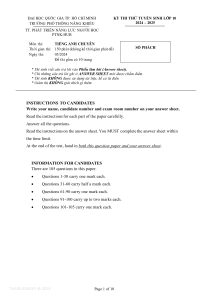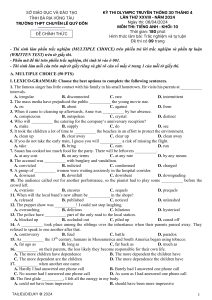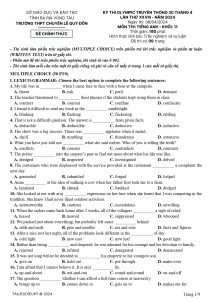Trích dẫn nội dung tài liệu "(The IELTS Workshop) Từ vựng diễn đạt, Từ vựng chủ điểm":
TỪ VỰNG DIỄN ĐẠT TỪ VỰNG CHỦ ĐIỂM By Tu Pham – Head Teacher at IPP IELTS www.ippeduca9on.vn TỪ VỰNG DIỄN ĐẠT • Nguyên nhân – Hệ quả (Cause – Effect) (*) • Giải pháp (SoluAons) • Lợi ích & Hạn chế (Pros and Cons) • Ngôn ngữ Chủ quan & Khách quan (SubjecAve – ObjecAve) • Ngôn ngữ Quan điểm cá nhân mạnh & Yếu (Strong Opinion – Weak Opinion) Nguyên nhân – Hệ quả • Sự việc A gây ra sự việc B • Một nguyên nhân của sự việc B là … • Hệ quả của sự việc A là … • Tác động của sự việc A tới sự việc B • Một số cách diễn đạt nâng cao Sự việc A gây ra sự việc B • A causes B • Global warming causes the melAng of icebergs. • A leads to B • UrbanisaAon leads to a higher rate of crime. • A results in B • OverpopulaAon result in various social problems • A is conducive to B (7+) Một nguyên nhân của sự việc B là … • One cause of B is that (S+V) • One reason of B is that (S+V) • Clear/ compelling/ convincing + reason (collocaAons của reason) • One factor that leads to B is that (S+V) Hệ quả của sự việc A là … • The result of A is that (S+V) • The consequence of A is that (S+V) • The corollary of A is that (S+V) (7+) Tác động của sự việc A tới sự việc B: • Tác động của sự việc A tới sự việc B: •
The effects of A on B • The impacts of A on B • A gây ra tác động tới B (collocaAons của effect-impact): • A + exert/produce an effect on B (7+) • A + exert/create an impact on B (7+) Tác động tích cực/ tiêu cực • Tác động pch cực (collocaAons của effect impact): • Good (5)/ PosiAve (6)/ beneficial/ desirable • Tác động Aêu cực (collocaAons của effect impact): • Bad (5)/ NegaAve (6)/ undesirable/ adverse (7+) • Detrimental (7+)/disastrous (7+) devastaAng (7+) Tác động tích cực/ tiêu cực • Tác động pch cực (collocaAons của effect impact): • Good (5)/ PosiAve (6)/ beneficial/ desirable • Tác động Aêu cực (collocaAons của effect impact): • Bad (5)/ NegaAve (6)/ undesirable/ adverse (7+) • Detrimental (7+)/disastrous (7+) devastaAng (7+) Một số cách diễn đạt khác: • A is the main culprit of B: sự việc A là thủ phạm gây ra sự việc B (tất cả mọi sự vật) (7+) • B can be ascribed to A: sự việc B có thể được quy kết do A gây ra (7+) • B can be aCributed/ aCributable to A: sự việc A có thể được quy kết do B gây ra (7+) • Air polluAon can be ascribed to traffic and industrial emissions. • A is the precursor to B: sự việc A là Aền đề cho sự việc B (7+) • A acts as a catalyst for B: sự việc A là chất xúc tác cho sự việc B (7+) • Diligence acts as a catalyst for success. TỪ VỰNG CHỦ ĐIỂM Transport Family Crime Business EducaAon and Children Media Health, Diets and Sports Technology Environment Culture Transport Minimise traffic density Address traffic congesAon MASS TRANSIT Lower the number of private vehicles Solve air polluAon Reduce traffic fumes Tackle global warming Transport • Mass transit Some people believe the government should spend money on building train and subway lines to reduce traffic congesAon. Others think that building more and wider roads is the beÅer way to reduce traffic congesAon. Discuss both views and give your opinion. • Environmentally friendly vehicles (i.e. bicycles) Nowadays people use bicycles less as a form of transport. Why is that? What can we do to encourage people to use bicycles more? • Traffic congesAon The best way for governments to solve the problem of traffic congesAon is providing free public transport in 24 hours per day, and seven days a week. To what extent do you agree or disagree? Question 1 • This trend can be _____________ to a few reasons. A: conducive B: ascribed C: tackled Question 2 • There are ____________ reasons as to why people hesitate to choose bicycles as a form of transport. Liệt kê 3 từ có thể kết hợp với reasons tạo thành collocaAons. - clear - convincing - compelling Question 3 • Đặt 1 câu sử dụng 3 từ sau đây: Soil erosion, conducive, deforesta9on Deforesta)on is conducive to soil erosion. Học từ theo story - How to ‘show of’ in the Speaking test by Dang Tran Tung, 9O/ 9S Head Teacher at The IELTS Workshop How you can lengthen your answers with ‘stories’? • A speaking answer consists of 2 main components: Information + Discussion • Vietnamese conversations include the former, but exclude the latter. ⇒
To get a good score, not only must you give an answer, you must also discuss the answer. • But how? How to discuss information • Freestyle – suitable for familiar topics familiar? - things you are genuinely interested in - things you encounter in daily life Example: Do you like food? Well, I’m a food lover, and I’ve got a ferocious appeAte, so I love to eat. I’m quite into Thai cuisine. You know, Thai dishes have really bold flavours; I mean, every bite just pops in your mouth, and for me that’s what food is all about. Well done! What about something like this? • Do you like history? - Most people: Well, I do, but I don’t know jack about history vocabulary… • Do you like books? - Most people: Well, I do, but I don’t know jack about book vocabulary... • Do you like swimming? - Most people: Well, I do, but I don’t know jack about swimming vocabulary… So whata you do? There are 4 main ways you can discuss an informaAon in IELTS Speaking. • example • benefits • popularity • opposite Give an example • Do you like history? Well, I take a very keen interest in History. One of my favourite areas of history is World History. I find the baÅles and wars among naAons in the past incredibly fascinaAng. • world history = example of history • battles and wars = example of world history => The idea is to tackle a specific aspect. Benefits • Do you like History? Absolutely, I love History. I think learning about History is very rewarding. It fosters a sense of patrioAsm and helps you appreciate the peace and order that we’re enjoying now. => The idea is to describe how it is good for you. Popularity • What do you think paAence is? Well, paAence is obviously a very posiAve quality. -> (popularity – is paAence common?) But unfortunately, nowadays, not a lot of people are paAent. I mean, we all want to get rich quickly but are unwilling to put it the hard work. Opposite • What do you like about your job? Well, I guess one of the most enjoyable aspects about my job is the lucraAve income. -> (what about your friends?) My friends, on the other hand, are sAll toiling away working dead-end jobs that don’t pay half as well as mine does. Stories • Busy (deals with Ame quesAon) • Benefits 1. Physical benefits: • get lean • miAgate the risks of obesity, diabetes and cardiac arrest
2. Mental benefits: • unwind/ let my hair down/ blow off some steam (~ relax) • alleviate stress Create your own story for each topic Shopping: • splurge on • lucraAve income • payday • hit the mall • feel flush Well, I make a pre<y lucra&ve income, so I love to shop. On payday, when I’m feeling flush, I usually hit the mall to splurge on clothes or nice shoes. Learn words in pairs Money • Expensive: exorbitant/ set you back a lot of money/ pricey • Cheap: reasonably priced/ dirt cheap/ affordable Describe a café • Why you like this cafe? Well, one of the most enjoyable aspects about the café is the price. The drinks are very reasonable priced, unlike some other cafes in the same area, where prices can be exorbitant due to their prominent locaAon. Question 1 Expand the following ques9on Do you like music? Well yes, I am a music lover. -> (example?) -> (benefits?) -> (example + discuss the opposite?) -> (example + popularity?) Question 2 Upgrade the following words • expensive (3 words) • cheap (2 words) • relax (2 words)



